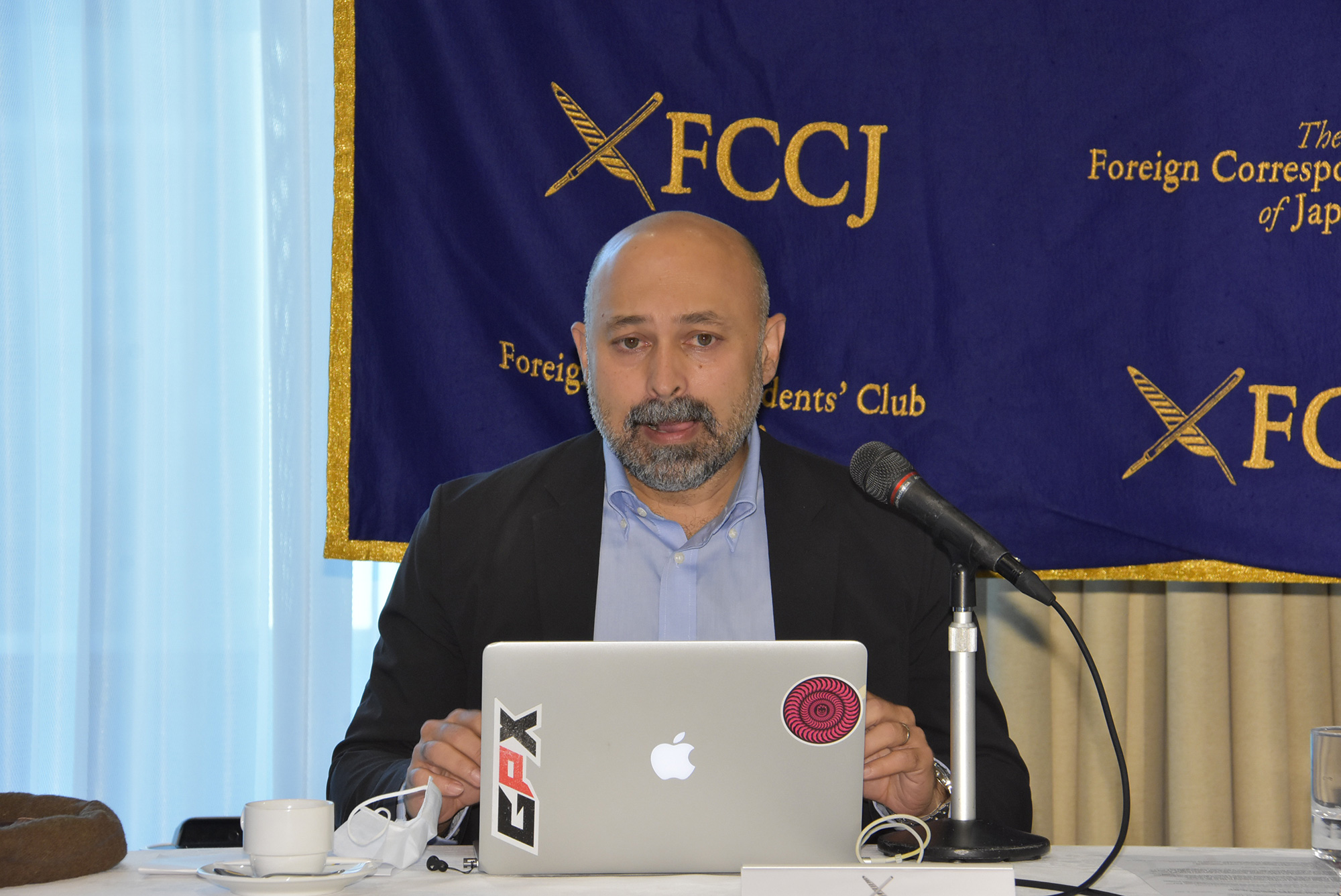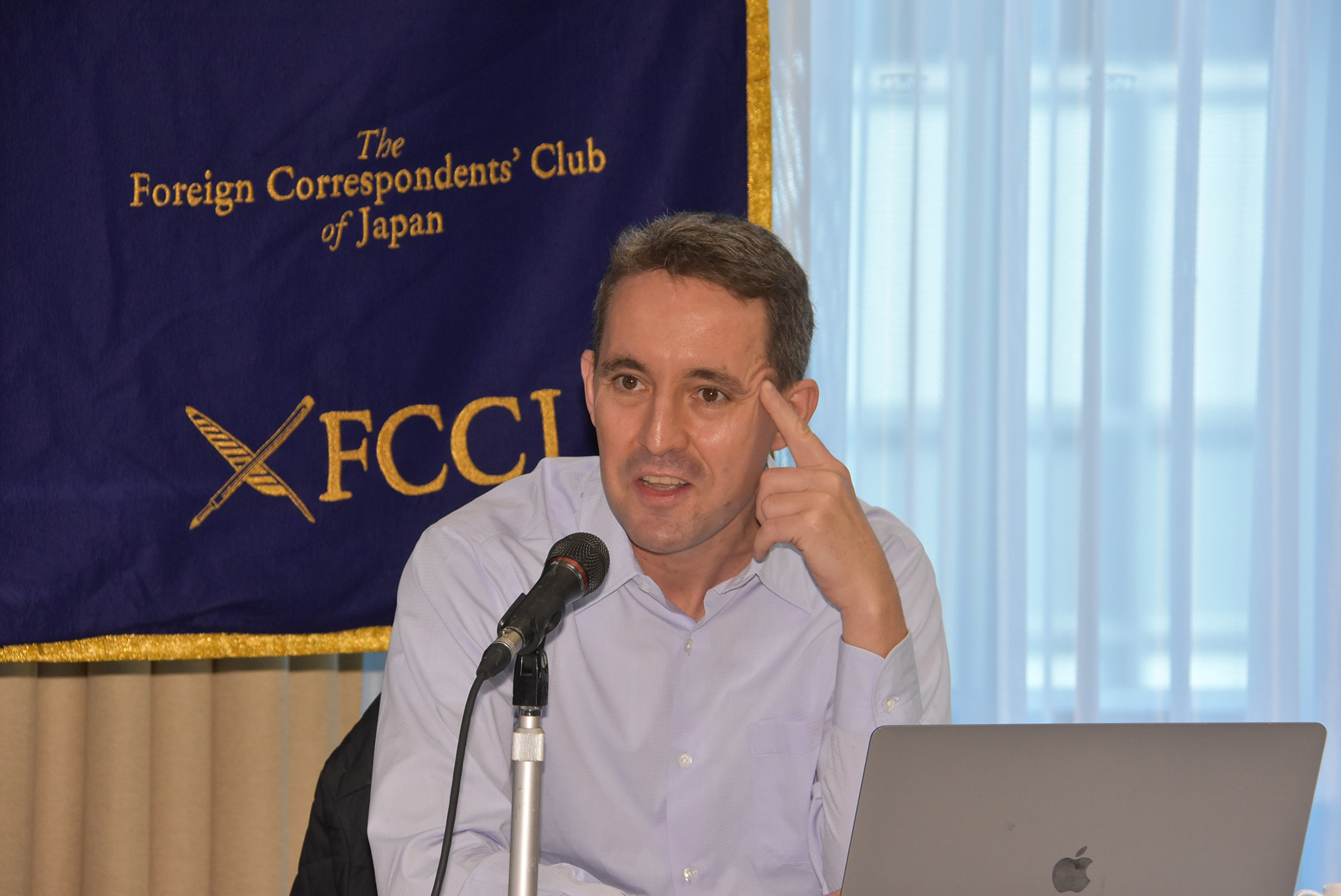Issue:
January 2023 | Deep Dive
Mild cases will linger, but Japan must not be complacent, experts tell FCCJ Deep Dive event

Could Japan and the rest of the world face not only a resurgence of the Covid-19 pandemic during this winter, but also a “twindemic” of coronavirus and influenza? And what of the additional risk posed by the respiratory syncytial virus (RSV)?
What are the implications for vaccination and masking, as well as for hospital bed availability, personal freedom, travel and the economy?
In short, will this be a winter of viral discontent?
To try to answer these questions, the FCCJ held a Deep Dive panel discussion in December featuring four experts.
The responses from Dr Gautam Dashpende and Dr Thomas Lomax were generally reassuring, although both acknowledged that there were unknown factors about Covid-19 that meant it would be wrong for Japan and the rest of the world to let their guard down.
Deshpande is a U.S.-board certified physician and founding Vice Dean of St. Luke's International University Graduate School of Public Health, while Lomax, a partner at Tokyo Medical and Surgical Clinic, managed a Covid-19 medical support service for institutions in Japan.
One thing that can be said with some certainty is that the situation is less serious in Japan than it was almost three years ago, when the pandemic caused widespread serious illness and death around the world, dangerously overburdening health services.

Covid-19, Lomax said, has become “more contagious but less lethal over the past three years, while population immunity has increased substantially as a consequence of vaccination and infection”. Medical infrastructure has adapted to cope with cases, he added. In 2021, cases were frequently “quite severe and hard to manage”, but by next year will be “common but mostly mild to moderate and manageable”.
Deshpande said the highly mutative virus would “never not be a threat”, but added that the worst appeared to be over. Lomax agreed, suggesting that most cases would be “mild or moderate”.
Covid-19 infections are on the rise again. Worldwide, the seven-day average of new cases rose from 365,000 to 555,000 between November 13 and December 12, according to data cited by Deshpande.
Separate data (from JHU CSSE Covid 19) shows that the seven-day average of new cases in Japan reached 144,000 on December 16 compared with around 35,000 on October 24 (although both figures remain well below peak new cases reported during earlier virus surges).
What of influenza? According to Deshpande, about 5,000 cases were reported in Japan during the week to November 28. The trend is up, but cases are not as high as seen during outbreaks over the past 10 years, while RSV cases reached 115,000 in the same period, much closer to the Covid-19 tally of 176,000.
Cases of RSV, a seasonal virus that usually peaks during the colder months, soared in Japan in 2020 and 2021. Cases are again rising at a "worrying" rate. Although data collected in Kanagawa Prefecture – a relatively good comparison for Tokyo – suggests that cases will not spiral out of control again, Deshpande said.
The rise in Covid-19 case should not be cause for alarm, with Lomax pointing out that infection numbers are a “very poor metric” for assessing the relative severity of Covid-19 outbreaks”.
Mortality statistics can also be problematic. Given that some people who are at the end of their lives die “with Covid” but not “from Covid,” excess morbidity is a better measure of the virus’s impact, according to Deshpande. The numbers of people who die directly as result of contracting the virus - is a "much better measure but much harder to calculate in real time”, he said.
There should be no increase in excess morbidity from here on in given the degree of population immunity achieved in Japan and improvements in medical resources. But the possible emergence of an “escape variant” of Covid-19 with higher morbidity levels than the Omicron strain could alter this significantly.
Hospitalisation statistics “are also problematic”, according to Lomax. A lot depends on the availability of beds rather than just the seriousness of cases. Japan now has an “abundance” of Covid-dedicated beds and can admit even mild cases for treatment with antiviral drugs such as Paxlovid.
Given the variables in measuring Covid's impact in terms of severity, morbidity and the availability of hospital beds, the best approach is to “continue to vaccinate more people, the elderly especially, while vaccinating low-risk people is of some additional benefit,” he said.
Vaccines manufactured by Pfizer BioNTech and Moderna have shown 95% efficacy against principal coronavirus strains, while Novavax is somewhat less effective, and Johnson & Johnson jabs are 68% to 85% effective against different virus strains.
What are the implications for advice on mask-wearing? Studies are quite limited, according to Lomax, who cited one carried out among 295,000 students and 46,000 staff at public schools in the greater Boston area over 40 weeks up to June this year. School that lifted mask mandates saw an additional 44.9 Covid-19 cases per 1,000 students and staff across 15 weeks compared to schools that kept masking, according to the study.
The “effective and appropriate use of masks has been one of Japan's great strengths”, Lomax said, while Deshpande said masking should continue in “appropriate setting” such as hospitals and crowded spaces.
This winter is certain to pose challenges for people in Japan – not least rising prices. But as things stand, there are no signs that Covid-19 will cause major economic or travel disruption.
Anthony Rowley is a columnist and contributor for The South China Morning Post.

